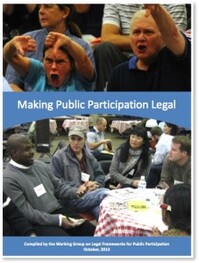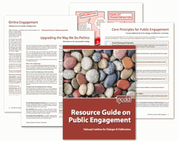 A Conversation Café is a 90-minute hosted conversation which is held in a public setting like a coffee shop, bookstore or library, where anyone is welcome to join. Its simple format helps people feel at ease and gives everyone who wants to a chance to speak. The CC method was created by Vicki Robin, Susan Partnow and Habib Rose. During the summer of 2001, Habib, a natural networker, invited Vicki Robin and Susan Partnow to experiment with organizing neighborhood gatherings of “Cultural Creatives” in Seattle. The Cultural Creatives: How 50 Million People Are Changing the World is a nonfiction social sciences and sociology book by sociologist Paul H. Ray and psychologist Sherry Ruth Anderson. The three Seattleites were set to launch Conversation Cafés in September 2001, but changed gears after the 9-11 terror attacks took place. They immediately began hosting CCs to help people process their emotions and thoughts on what had and was happening in the country.
0 Comments
Posted by D&D Resources | December 24th, 2009
Dialogue and deliberation are dynamic processes which can be empathy-enhancing, relationship-changing, problem-solving, action-planning, organization-developing, community-building, conflict-resolving, skill developing, prejudice reducing, consciousness-raising, and more! The various models and methods that are used in our field often emphasize, strive for and obtain different outcomes. This resource shares some great quotes from over a dozen leaders in the D&D community about what “dialogue” means to them. Also see our list of leaders’ definitions of deliberation. How do people in the field describe dialogue?‘Dialogue is shared exploration towards greater understanding, connection, or possibility.’ The 42-page article, Affinity Groups, Enclave Deliberation, and Equity (2016), was written by Carolyne Abdullah, Christopher Karpowitz, and Chad Raphael, and published in the Journal of Deliberative Democracy: Vol. 12: Iss. 2. The article provides evidence for the practice of holding enclaves for marginalized groups within dialogue and deliberation processes, as part of a larger conversation. They have found that by creating space within affinity groups for enclaves to dialogue; processes are more inclusive, participatory, and democratic. The authors show several ways in which enclave groups can be used in democratic processes and implemented within government practice.
Read an excerpt of the article below and find the PDF available for download on the Journal of Public Deliberation site here. From the article…  Most of the laws that govern public participation in the U.S. are over thirty years old. They do not match the expectations and capacities of citizens today, they pre-date the Internet, and they do not reflect the lessons learned in the last two decades about how citizens and governments can work together. Increasingly, public administrators and public engagement practitioners are hindered by the fact that it’s unclear if many of the best practices in participation are even allowed by the law. Making Public Participation Legal, a 2013 publication of the National Civic League (with support from the National Coalition for Dialogue & Deliberation), presents a valuable set of tools, including a model ordinance, set of policy options, and resource list, to help communities improve public participation. The tools and articles in Making Public Participation Legal were developed over a year by the Working Group on Legal Frameworks for Public Participation — an impressive team convened and guided by Matt Leighninger, formerly of the Deliberative Democracy Consortium (DDC). Song Of A Citizen produced several series of dialogue and deliberation-related videos. The first was a series of Video Op-Eds with esteemed political philosophers, academics, and leaders of major deliberative democracy organizations. Those were filmed at various locations around the country between 2008 to 2010.
The second series features Q&A interviews with key practitioners and other experts in the dialogue and deliberation community, filmed at the NCDD Conference in October 2012. All can be found on the SoaC YouTube Channel. Song of a Citizen YouTube channel: https://www.youtube.com/channel/UC5SfcjE5O4OjdUw7Jjfvvew This short thread is an archive of a discussion on the NCDD forum started on July 9, 2004 by Matt Leighninger.
Describing D&D: what can make our message compelling? Post by mattleighninger » Fri Jul 09, 2004 10:55 am I don’t think the advocates of dialogue and deliberation at the national level have done a very good job promoting this kind of work. Most of the messages we send seem to say that D & D is worth doing because it is a Good Idea that will make the world a Better Place. That isn’t a very compelling message – not just because some people disagree, but because it doesn’t give the people who do agree an immediate reason to start doing D & D. There are all kinds of ways to make the world a Better Place, but how many of them does a person have time for, given the demands of work and family? This is an archive of a 2004 discussion on the NCDD Discussion list. This discussion on Polarization & D&D starts with Lars Hasselblad Torres’ response on July 26, 2004 to an introduction by new NCDD member David Hilditch, who wrote “I share with many of you a growing concern about the long term corrosive effects of polarization.”
Lars Hasselblad Torres:David hi :: Great to have you on this list. This “two Americas” debate that is being raised in the news these days (drawing a lot on Stanley Greenberg’s work I think) is likely to be just as live an issue after the election. Here is the transcript of a rich conversation we had on NCDD’s Discussion list in February 2010 with the subject “Conservatives and Liberals,” initiated by Pete Peterson. A big thank-you to Martin Carcasson for keeping track of these posts and sharing his archive!
All, For those who may be interested in how Conservatives see the world and public engagement, I’m linking here two recent essays. Some might remember the “Conservatives Panel” at the NCDD Conference in Austin. During the discussion, I was asked why there are so few right-wingers in the field of dialogue and deliberation. I remember fumbling out an answer that Conservatives tended to hold to certain principles or “truths”, and thus viewed the D&D field as inherently progressive – that “public engagement” efforts often ran past a discussion of “ends”, focusing on a dialogue over means. Well, I wish that Harvey Mansfield had written this piece two years ago…he’s so much smarter: http://weeklystandard.com/articles/what-obama-isnt-saying The following comments were made over the NCDD Discussion list a few years ago when Leah Lamb posed this question: “I have been pondering about how we can actively make the D&D lexicon more familiar to the greater public? I am curious to learn about how those of you on the listserv approach describing the fields of D&D, and more specifically, how you address the complexity of the wide range of definitions and practice.”
Here are some of the great responses in his thread: I just use the term ‘dialogue’ which seems to communicate universally. Here is a wonderful summary by Geoffrey Morton-Haworth of a January 2011 discussion in NCDD’s LinkedIn group on ground rules and best practices in virtual facilitation. The discussion was started by group member Martin Pearson with the subject “Groundrules necessary to make the best of virtual meetings."
Martin wrote that he was starting to use Skype more for meetings, and asked group members if they have created specific ground rules for their own virtual meetings (like asking people to not to browse the internet while participating in the meeting). The conversation morphed into a rich discussion on best practices for virtual meetings, with over 30 comments shared. Virtual Meetings: Design with the ‘Distracted Participant’ in Mind Geoffrey Morton-Haworth posted on February 03, 2011 03:39 There has been a useful discussion in a LinkedIn group over the last few weeks. The group was the National Coalition for Dialogue and Deliberation (NCDD) and the topic was “ground rules for making the best of virtual meetings”. It is an important topic since more and more of us meet and work together over the internet these days. The drawback with LinkedIn discussions, however good, is that they tend to fade away into hyper-space (I don’t think they are picked up by search engines, maybe this is accidental or maybe it is by design to ensure that such discussions remain relatively private). Therefore what follows is an attempt to distill and record this conversation. The following is a transcript of a rich discussion on consensus that occurred on NCDD’s main discussion list in March and April, 2005. This discussion was begun by Rogier Gregoire on March 20th, 2005. Enjoy!
Rogier A. Gregoire:I have been following this particular thread with interest and would like to bring to the conversation a particular insight. The discussion on whether one can have, and honor a particular point of view is critical to dialogue. What has not been considered is how easily we (within the conversation) avoid the issue of diversity as an asset. The dialogic conversation must honor diversity as an asset not just a convenience or mechanism of conversation. NCDD’s October 2010 Resource Guide on Public Engagement showcases the National Coalition for Dialogue & Deliberation’s best collaboratively-created products (like the Core Principles for Public Engagement and the Engagement Streams Framework), as well as recognizing and directing you to a lot of the great work on public engagement that has been done by others in our field.
Created for our 2010 regional events (all attendees received a copy), this must-have guidebook was developed to share stories and resources with the dialogue and deliberation community, public managers, and anyone else with an interest in public engagement.  NCDD’s October 2010 Resource Guide on Public Engagement showcases the National Coalition for Dialogue & Deliberation’s best collaboratively-created products (like the Core Principles for Public Engagement and the Engagement Streams Framework), as well as recognizing and directing you to a lot of the great work on public engagement that has been done by others in our field. Created for our 2010 regional events (all attendees received a copy), this must-have guidebook was developed to share stories and resources with the dialogue and deliberation community, public managers, and anyone else with an interest in public engagement. Here’s how the Engaging Cities blog described the Resource Guide: It’s a small compendium full of valuable knowledge on all facets of public engagement. Not only does the guide contain a directory of valuable resources, points of contact, and case studies of collaborations that work, but it also contains some of the more exciting results of last year’s conferences. Items such as the ‘Core Principles for Public Engagement’ remind us of how far we’ve come, the commonality of our goals and how much more we have yet to achieve. The brief ‘Online Engagement’ section of the manual is a fantastic introduction and database of resources, including Public Agenda’s Promising Practices to Online Engagement that we helped write. And the ‘Upgrading the Way We Do Politics’ portion of the manual addresses common issues found when politics and public engagement intersect. Handling the material in a constructive manner, NCDD provides helpful tips and positive suggestions for improvement. Extremely informative, the ‘Engagement Streams’ matrix ties common goals of public engagement to strategies that complement those goals in proven ways while also showcasing key features that will help in achieving that goal. The matrix is invaluable for anyone involved in public outreach. In fact, the entire manual is invaluable for anyone involved in public outreach and engagement. Resource Link: NCDD Resource Guide NCDD’s email discussion lists are open to anyone whose work involves dialogue and deliberation — not just NCDD members. Our discussion lists foster networking, information-sharing and collaboration within the ever-growing dialogue and deliberation community.
First, thank you to L-Soft for their generous support! Since 2008, NCDD has benefited from the generous donation of mailing list services by L-Soft, a leading provider of email list management software, email marketing software and email list hosting services. NCDD has been relying on L-Soft’s LISTSERV® email list management software solution since 2006 and all our mailing lists are hosted by L-Soft free of charge. Current NCDD Listservs
The Public Engagement Principles (PEP) Project was launched in mid-February 2009 to create clarity in our field about what we consider to be the fundamental components of quality public engagement, and to support President Obama’s January 21, 2009 memorandum on open government. The following principles were developed collaboratively by members and leaders of NCDD, IAP2 (the International Association of Public Participation), the Co-Intelligence Institute, and many others.
Enjoy this interactive DebateGraph of the principles! Click on a principle to see the additional text on what the principle looks like in practice, and what to avoid. |
Categories
All
|
Follow Us
ABOUT NCDD
NCDD is a community and coalition of individuals and organizations who bring people together to discuss, decide and collaborate on today's toughest issues.
© The National Coalition For Dialogue And Deliberation, Inc. All rights reserved.
© The National Coalition For Dialogue And Deliberation, Inc. All rights reserved.

 RSS Feed
RSS Feed